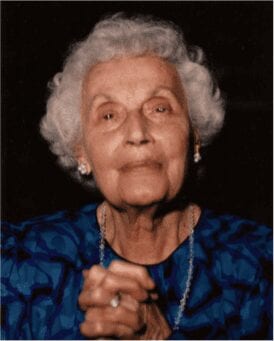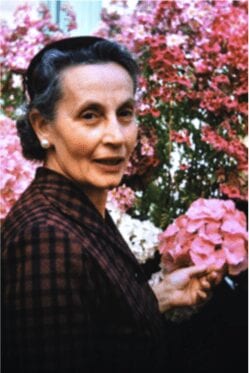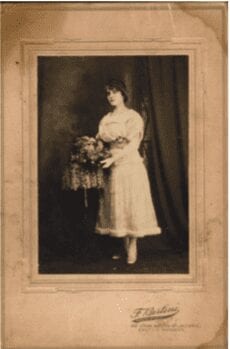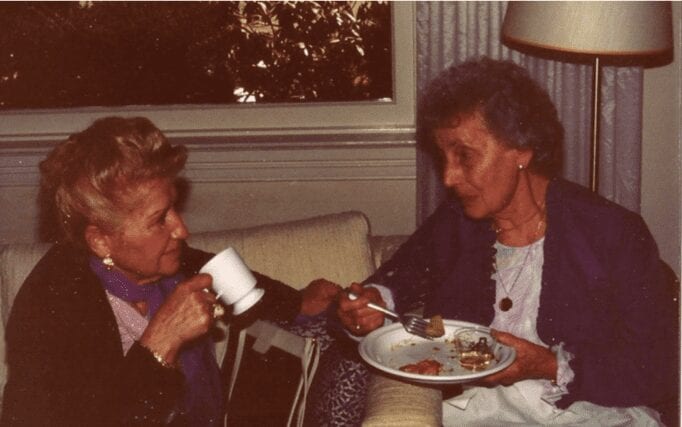LEGACY
A few days after my mother, Nancy LaBarbera Gagliano, died on 9 January 1994 (a month short of her 96th birthday), in Mountain View, California, I delivered, at St. Joseph’s Catholic Church, her Eulogy.
I delivered the Eulogy again the following April for the East Coast family and friends at a church in Fairfield, Connecticut. The next Fall I delivered the Eulogy as part of an evening of “Legacy” pieces at New York’s Primary Stages; and again, the following spring, as part of a weekend of “Legacy” pieces, produced by Pittsburgh’s Pyramid Productions.
Then I lost the Eulogy file. For good, it seemed. Until — miracle of miracles—after all these years, a few weeks ago, It turned up under another name, in some old, buried, converted-to-Word, files. As another 9 January approaches, I’d like to share the Eulogy with you. Special to me, of course, but the immediacy of an emotional tribute to a remarkable mother and woman, might be of interest to you.



[Nancy LaBarbera Gagliano photos: Senior, Mid-life, marriage]
EULOGY
This is the eulogy I delivered on 12 January 1994, at St. Joseph’s Catholic Church, in Mountain View, California —three days after my mother, Nancy LaBarbera Gagliano, died
“During the last days of mama’s life, and even into the last hours in the hospital, when she recognized new visitors at her bedside — and even though she hardly had enough strength left to speak — she would manage to get out the same few words — words that were extremely important to her — as they had been important to her throughout her almost 96 years. And the words were these: “Did you eat?” It was funny, of course; but it was also mama’s true essence: To nourish.
“A nourisher. That’s what my mother was. Nourished everything and everyone. Every time you just came into contact with mama — you were nourished. By her mind, her bearing, her sense of humor, her physical beauty — for she truly was a beautiful woman, by any standards; by her ability to empathize — to share your pain; and nourished by the common-sense advice she gave when people came to her for it — as they often did. And of course, in the days when she could move around freely, you were nourished by her cooking. . . .
“She knew I loved calamari and whenever I came out to visit in those days, she’d scrub those baby squid squeaky clean, cooked them in a great tomato sauce, and made sure I had my fill. And who could forget Nancy’s stuffed mushrooms? My wife, Sandy, uses mama’s recipe — and if Sandy doesn’t serve the stuffed mushrooms at a dinner party, instead of thank-you notes we get hate mail from half of Pittsburgh.
“And my mother was regal. She had a regal bearing. In her last years, in her sunny apartment in Mountain View — across the patio from my niece Stephanie — when you visited mama, she’d greet you from her favorite chair — as royal as the queen of England, waiting to meet her loyal subjects — with an Afghan (an “Af-a-ghan,” she used to call it) — one she made herself — laying loosely across her lap; and you almost literally sat at her feet and listened to her talk. And could she talk! She was essentially self-taught — learned to read English on her own, somehow, but had no trouble making sense of, and conversing on, current events, politics, music — especially on her beloved Italian opera, arias from which — in her young days — she’d sing while doing housework.
“An early remembrance, in fact, was her singing voice. It was really quite lovely. I recall her washing windows in our Brooklyn apartment and singing away. What was remarkable about that was the technique she had for washing the windows on the third floor. She’d sit on the window ledge, her legs dangling out the side of the house, pull the window down to her lap to secure herself and start washing the inside top and lower panes. I can’t quite recall how she did the outside panes, but there was some equally dangerous maneuver for that. My point is, that when she should have been shivering and praying, perhaps, she’d be cheerily singing; from Puccini and Verdi, usually; or humming her favorite song, “Ah, Sweet Mystery Of Life At Last I Found Thee.
“And, of course, she was the family historian. If you needed to know anything about the family history: dates, facts, names — you went to mama. On one of our last visits, my wife and I took mama home from a family gathering. It was late and she was tired. But I asked her a few questions about the family — things that had always perplexed me, and she talked — for over an hour — almost non stop. It was essentially a monologue in which she created vivid character studies — of her mother and father, her brothers and sisters — about their struggles in Italy and when they first got to this country; and she maintained the threads of each storyline and even analyzed behavior. It was great story telling. And the more she talked, the stronger she got — the younger she seemed to get. It was an amazing performance that could have gone on all night — but my wife and I couldn’t; we were too tired. Couldn’t match her energy.
“Mama was also my News Anchor Person, giving me the news of the week when I called each weekend; thorough reporting, always accurate — mixed in, in her last years, with a rage against her body, which was betraying her. I’ll miss those calls. (And, in fact, at some point on each Sunday since she died, I’ll instinctively say, “It’s time to call, mama.”
And then I’ll remember. . .)
“She was an organized person; always had “a system.” And she was a born leader (a general LaBarbera trait? —It certainly was true of Nonna!). I’ve often felt that had mama been born closer to our time she might have had the opportunity to be a CEO in a top company. And Lord help the people who failed to produce.
“She could be difficult: Hard headed at times, irritable, often trying to get you to do it her way — often getting you to do it her way (more LaBarbera traits?). No! — she wasn’t a saint. But whatever she did, she did with a sense of style — and with love and understanding.
“Understanding. One of mama’s great legacy’s is the kind of humanistic understanding she possessed. By that I mean that she always had a basic tolerance — an acceptance of the failings of human beings; an “understanding” of that; that there wasn’t only one truth, but a myriad of truths, filtered through experience and pain. And I was taught that — that understanding, that acceptance, that tolerance; and I know my sisters were taught those; and I see that those traits have been handed down to the grandchildren and great grandchildren. We are truly an accepting family — and those LaBarbera traits in mama — understanding, acceptance, tolerance — in large part, were the models for that. She didn’t have one mean-spirited bone in her body — she really didn’t. And as I said, she had great empathy for those afflicted or less fortunate. One of her constant phrases — often said in Sicilian– was, “poor thing.”
“And she had an unending curiosity; about other people, customs, cultures, whatever. My wife, as you know, is Jewish; and mama attended a number of Seders with us — at which mama read the service with everyone at the table. She loved doing it; and they loved her for that. The one picture we have of my mother and mother-in-law, Ester Gordon, together, deep in conversation, was taken at my son’s bar mitzvah party. My mother was very proud of that day.

Esther Gordon and Nancy Gagliano
“One certainly cannot talk of mama’s accomplishments without talking about the family she produced. During one truly magical moment in the hospital — on Saturday, the day before she died (a moment I’ll never forget — and which keeps coming back to me in the oddest moments), most of the grandchildren and great grandchildren visited; and each time one came in, mama, of course, lit up — but when she saw the newest great grandchild — when my nephew Anthony held up his newest beautiful son, Philip — mama said —and it was the way she said it — with hardly any voice left — she said: “Ah! The Baby.” And the joy “from mama’s smile — the overwhelming love in that smile— should have suspended all evil and conflict raging in the world in that moment. And there was a ninety five year connection from mama’s smile to that latest grandchild that spoke volumes about human continuity — and about the continuity in her great family. And I’d like to believe that my mother saw that, in that moment, and that that moment gave her her greatest joy and peace.
“As is often the case in these situations, the women bare a great deal of the burden. That was the case with my wife, Sandy — who was constantly flying back and forth to Florida to tend to her failing mother’s needs — in fact, Sandy had to be with her mother when my mother died — which saddened Sandy very much, because she loved mama. And I’m convinced that my mother had years tacked onto her life because my sister Nina took such magnificent care of mama, year in and year out, day in and day out — and I know there has been a great daily emptiness in Nina’s life since mama died. And when my sister Sylvia was with mama — literally around the clock — in mama’s last days, in the hospital — using her professional nursing skills to ease mama’s discomfort, I was always aware of how difficult it must have been for Sylvia to minister to her own mother’s suffering. But minister she did. My sisters are the greatest — in great part because of mama’s influence.
“And then there were my niece Stephanie — over all these years — running to check on grandma from across the patio if mama so much as coughed differently during the night; and Stephanie’s twin daughters — mama’s great grandchildren, Gianna and Rose — two of the best, loving, care givers anyone could have asked for — and who have been devastated by their great grandmother’s death; and the other grandchildren; Donna, Andrea, Matthew and Anthony, who visited, took her out, cooked for her, included mama in their lives; and the other great grandchildren, Mary Kay, David, Audrey Anna, Jodie and Tracy, Angelene and, of course, baby Philip — all of whom lit up mama’s life; as well as Edward, David, Nancy and my son, Rico —loving, caring, bright human beings. And then there were Mama’s sons and daughters in law; Philip, Larry, Don, David, Sandy, Jennifer, my wife Sandy — all of whom, I know, loved and supported mama as if she were their own mother — along with my brother-in-law’s sisters, Connie and Lee and their families. . .and even Teresa, a volunteer visitor who became family. . .and Rita, who ministered communion to mama every week — all, all loved and cared for her.
“With Mama gone, only one LaBarbera remains; Uncle Jimmy, winding down, who lives now in Mountain View. Mama joins her mother and father, Nonna and Nonno; and her remarkable and beautiful sisters Angelina and Jenny; and her brothers Sal, Freddy (both of whom gave me my haircuts when I was a kid), and Joe and Tom (who gave me a lot of laughs). And, of course, finally, she joins my father and my brother. She also joins Aunt Adeleine, cousin Rosemary (who died too many years before her time) and Joe Mondello (who died too many years before his time) and Peppino Mondello, and Uncle Jimmy Patauris and Aunt Josie — and so many, many others.
“One of the last questions she asked me in the hospital when she revived from one of her deep sleeps was: “When do you have to go back?” She always asked that whenever I’d come to visit over the years — she hated to see me go; to see anybody go. “When do you have to go back?” she asked from her hospital bed. And I said something like, “I’ll stay as long as I have to, mama.” It turned out to be not very long, indeed.
“But when it’s my turn — and if I’m lucky enough to make it up to where mama is waiting with the whole LaBarbera clan — she’ll, of course, by then, be heaven’s Nourisher. — So, after she first asks me, “Did you eat?” and feeds me with her heavenly calimari and stuffed mushrooms — she’s bound to ask me:
“When do you have to go back?” And then I’ll be able to say: “Never, mama.”
Bless you, mama — and all my Uncles, Aunts, cousins, mother in law — all gone. And bless us all.”

Nancy Gagliano
[1898-1994]
